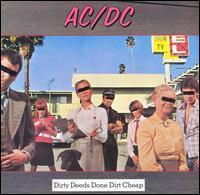
- Format: MP3

Originally released in 1975, Dirty Deeds Done Dirt Cheap did not hit the U.S. until 1981, when AC/DC became rock icons the previous year and fans were growing hungry for more material featuring the band's late singer, Bon Scott. Overall, the record is worth the wait, even if there is absolutely no reason to place "Problem Child" on the album since it was placed on Let There Be Rock. The title track became a concert staple for the band, but Dirty Deeds's most well-known track is arguably "Big Balls," a sleazy, ambiguous number that would become one of the band's most well-recognized songs. The album's greatest artistic moment, however, comes in the form of "Ride On," where AC/DC experiments with a slow, rhythmic blues ballad. The song, highlighted by the Keith Richards-inspired licks of Angus Young and the haunting, melancholy lyrics of Bon Scott, shows AC/DC in a rare sensitive form yet manages to retain the raw power that has since become the band's trademark ("Ride On" would be the only Bon Scott-era song to be placed on the 1986 compilation Who Made Who). On the whole, Dirty Deeds is a fine album with some nice treats for diehards. Though it may not be as well-crafted as the in-memory-of-Bon classic Back in Black, Dirty Deeds Done Dirt Cheap is another fitting eulogy to one of hard rock's most influential vocalists. [In February 2003, the American distribution rights to AC/DC's back catalog transferred over to Epic, their new label. Epic reissued the band's catalog as remastered digipacks containing lavish, expanded booklets with plenty of rare photographs, memorabilia and notes. Although the digipacks may wear a little too easy, the sound is terrific — clean and muscular, enhancing the raw qualities of the original record — and the packaging is loving, making the reissues necessary for collectors.]